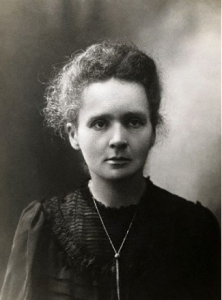
Born Maria Salomea Skłodowska on 7th November 1867 in Warsaw, Poland, Marie Curie’s dedication to her studies would lead her to discovering 2 new elements and to not only become the first women to win a Nobel prize but to win two Nobel prizes in different subjects.
Click ‘Read more‘ to find out more about the life of Marie Curie.

The youngest child of teachers Bronisława and Władysław Skłodowski, Marie went to a boarding school before studying at a gymnasium (equivalent to a grammar school) for girls where she successfully graduated with a gold medal. As a woman she was not allowed to attend a regular higher education course, so instead Marie and her older sister attended a Flying University – an underground university with classes held in secret. Marie and her sister were determined to go to university but because of a lack of finance the two sisters made a deal: Marie would work as a governess for 2 years to support her sister’s studies in Paris, after which she would return the same favour for Marie.
In 1891 Marie moved to Paris to live with her sister and enrolled at the Sorbonne studying physics, chemistry, and mathematics. In the evenings Marie would often get so focused on her studies she would forget to eat, leaving a damaging effect on her health. In 1893 25-year-old Marie was awarded a degree in physics. A year later she earned a second degree and studied under scientist Pierre Curie, who she would go on to marry.
Together Marie and Pierre worked as research scientists at the School of Chemistry and Physics in Paris where they worked on investigating the radioactivity of a mineral called pitchblende. Their work led the to discovery of 2 entirely new elements: Polonium and Radium. In 1903 Marie became the first woman to win a Nobel prize for the breakthroughs she and Pierre made on radioactivity with French physicist Henri Becquerel.
In 1906 Pierre was killed in a road accident with a horse and cart. Devastated, Marie nonetheless carried on the work they had begun together and went on to win another Nobel prize, this time in chemistry. With this, she became the first person to win 2 Nobel prizes in separate subjects. When World War 1 started in 1914 she stopped her studies to give her time to support injured soldiers with the use of portable x-ray machines. It is estimated that her units treated over a million soldiers.
Due to her many hours of being exposed to radiation – the damaging effects of which were unknown at the time – Marie Curie died on 4th July 1934. Her legacy is one of brilliance, resourcefulness, charity, bravery, and modesty in equal parts, a true hero driven to succeed not for her own gains but for the betterment of humankind.
Marie Curie quotes:
“Nothing in life is to be feared; it is only to be understood.”
“Be less curious about people and more curious about ideas.”


 2
2

















